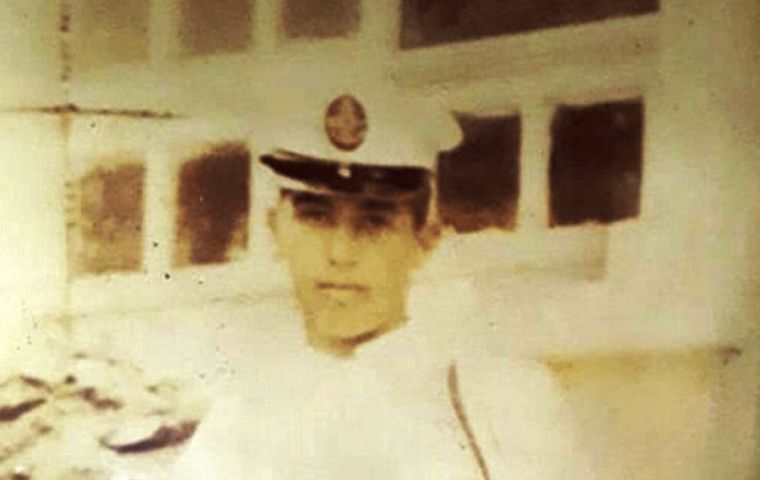MercoPress. South Atlantic News Agency
Humanitarian project identifies Argentine soldier #114 at Darwin
 Ramón Meza died in action on May 25, 1982.
Ramón Meza died in action on May 25, 1982. A new body has been identified, raising the number of Argentine combatants fallen during the 1982 Falklands War who now have a name on their graves to 114, thanks to the Humanitarian Project underway.
Corporal (post mortem) Ramón Antonio Meza no longer is just another “Argentine soldier known only to God” at the Darwin cemetery after nearly four decades.
His mother Delia Bernardina Meza, 77, and his brothers Juan and Jesús received the news they had expected about their loved one on Monday.
Meza perished on May 25 of wounds sustained when splinters of a delay bomb dropped by a Vulcan hit him on East Falkland's Yorke Bay, north of the local airfield.
He was being ferried by helicopter to Stanley for help but died on the way, clutching the picture of the woman he loved.
“He had a picture of his girlfriend and every time he would pull it out and show it to us. He'd say: 'Look, you envious ones, how pretty my girlfriend is; when I get back I'm going to marry her and she's going to be the mother of my children,'” fellow private Ramón Orlando Mendoza,
told reporters a while back.
“When he was shot, in that last second of life, he took the photo out of his pocket and the only thing he did was press it against his chest. He thought of the love he left in [the province of] Corrientes until his last breath,” recalled the Goya-born Mendoza.
Meza was born in Curuzú Cuatiá, also in the province of Corrientes. The eldest son of a humble family, which the father had abandoned for good, Ramón was also the support of his mother and his five brothers.
He was drafted into the Marine Corps' No. 1 Brigade at a time when military service was mandatory. After April 2 his unit was to be deployed to the islands but he was spared given his financial contribution to his family. But he insisted and volunteered. He was sent to the islands as a 12.7 machinegun operator.
“When I heard about his death, I thought: Who is going to tell his girlfriend? Who is going to tell her that he died among stones after a bombardment of English planes, while frigates chased us with cannons? I felt tremendous pain and helplessness,” Mendoza recalled.
The cause for the identification of soldiers buried in unnamed tombs in Darwin - fostered by Argentine veteran Julio Aro and Infobae journalist Gaby Cioffi with the support of British Colonel Geoffrey Cardozo, musician Roger Waters and the Argentine Forensic Anthropology Team brought some consolation to 114 families that for almost four decades did not know the final destination of their loved ones.
Of the 121 unnamed tombs -122 bodies- included in the Humanitarian Project Plan, only eight soldiers remain to be identified, in addition to the three bodies buried in tomb C-1-10, for which it will be necessary to extend the agreement signed between Argentina and the United Kingdom in 2016 to complete the identification process.
“If Argentina requests it, we will do whatever it takes to collaborate in any other humanitarian work,” Mark Kent, the British ambassador in Buenos Aires was quoted as saying.
“Recently I met with the Ambassador of the United Kingdom and the Commission of Relatives of the Fallen in Malvinas, with whom we are in a very close relationship, to continue deepening the work that enables us to reach all the identifications,” Argentine Human Rights Secretary Claudio Avruj explained.
He added that “the work done would have been impossible without the commitment, affection and closeness of the family members, who in an act of courage decided to give their DNA samples to know the fate of their loved ones, with what was done in this Humanitarian Plan, I think we are getting to honour that trust.”




Top Comments
Disclaimer & comment rules-

-

-

Read all commentsEs, Think, but then I doubt the schooling you may have had covered such a basic element of the German language. And Darwin was definitely British, not German or Scandinavian. It is after Charles Darwin that it is so named.
Jul 17th, 2019 - 05:20 pm +2There are no Argentine soldiers buried in Darwin Cemetery, Think. And no amount of your saying otherwise will change that.
For you Argies, reality is very flexible.
Jul 17th, 2019 - 07:48 am +1Capisci... ?
Given the Argentine predilection for naming everything to suit themselves I'm always slightly surprised that they use a British name already in use for somewhere else. A few of us have considered renaming the Argentine Military Cemetery Fish Creek Cemetery, just for the Argentine press and visitors.
Jul 17th, 2019 - 09:51 am +1After all, Think, it's nowhere near Darwin.
Verstehe Sie?
Commenting for this story is now closed.
If you have a Facebook account, become a fan and comment on our Facebook Page!